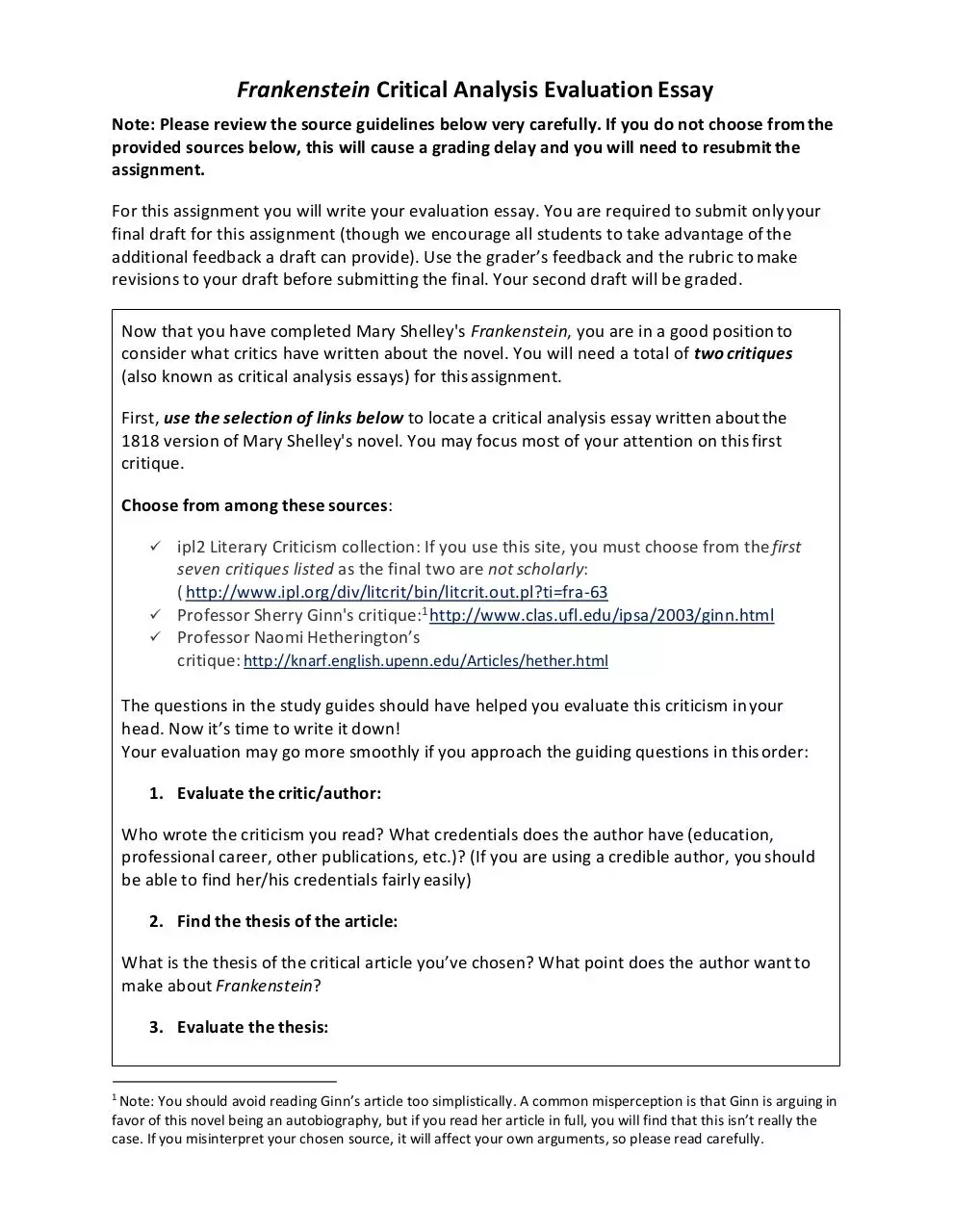Frankenstein Critical Analysis Evaluation Essay Update Final (PDF)
File information
Author: Anissa Sorokin
This PDF 1.5 document has been generated by Microsoft® Word 2016, and has been sent on pdf-archive.com on 20/04/2018 at 11:13, from IP address 124.106.x.x.
The current document download page has been viewed 616 times.
File size: 637.89 KB (4 pages).
Privacy: public file




File preview
Frankenstein Critical Analysis Evaluation Essay
Note: Please review the source guidelines below very carefully. If you do not choose from the
provided sources below, this will cause a grading delay and you will need to resubmit the
assignment.
For this assignment you will write your evaluation essay. You are required to submit only your
final draft for this assignment (though we encourage all students to take advantage of the
additional feedback a draft can provide). Use the grader’s feedback and the rubric to make
revisions to your draft before submitting the final. Your second draft will be graded.
Now that you have completed Mary Shelley's Frankenstein, you are in a good position to
consider what critics have written about the novel. You will need a total of two critiques
(also known as critical analysis essays) for this assignment.
First, use the selection of links below to locate a critical analysis essay written about the
1818 version of Mary Shelley's novel. You may focus most of your attention on this first
critique.
Choose from among these sources:
ipl2 Literary Criticism collection: If you use this site, you must choose from the first
seven critiques listed as the final two are not scholarly:
( http://www.ipl.org/div/litcrit/bin/litcrit.out.pl?ti=fra-63
Professor Sherry Ginn's critique:1 http://www.clas.ufl.edu/ipsa/2003/ginn.html
Professor Naomi Hetherington’s
critique: http://knarf.english.upenn.edu/Articles/hether.html
The questions in the study guides should have helped you evaluate this criticism in your
head. Now it’s time to write it down!
Your evaluation may go more smoothly if you approach the guiding questions in this order:
1. Evaluate the critic/author:
Who wrote the criticism you read? What credentials does the author have (education,
professional career, other publications, etc.)? (If you are using a credible author, you should
be able to find her/his credentials fairly easily)
2. Find the thesis of the article:
What is the thesis of the critical article you’ve chosen? What point does the author want to
make about Frankenstein?
3. Evaluate the thesis:
1
Note: You should avoid reading Ginn’s article too simplistically. A common misperception is that Ginn is arguing in
favor of this novel being an autobiography, but if you read her article in full, you will find that this isn’t really the
case. If you misinterpret your chosen source, it will affect your own arguments, so please read carefully.
Do you agree with this thesis? Why or why not? We’ve covered many ideas in the study
guides. Can you find points within the guides that support your agreement or
disagreement with the critical writer(s)? Look for new supporting information rather than
revisiting the same ones the critics have chosen.
4. Evaluate the support:
Whether you agree or disagree with the thesis, does the critic provide sufficient research
from the text and outside references to make a strong case? What does the article have for
support from the text or outside sources? In your opinion, what makes these references
valid? Do you feel the author uses this support properly?
Next, locate a second critique about the novel that includes ideas somewhat similar (genre
classification, for instance) to any of the discussions you have in your essay. The second
critique can either support or refute any of the claims in your paper. The objective of this
portion of the essay is to further support your opinion of the primary critic’s thesis or
support. Therefore, for example, if you choose a secondary article that refutes any of your
claims, you will need to counteract those ideas to bring the focus of your essay back in
alignment with your essay’s thesis (your personal opinion of how the primary critic is
either correct or incorrect in his or her thesis claim and/or how the first critic is either
effective or ineffective in his or her support). Every discussion in this essay should
ultimately support the claim you make in your thesis.
For instance, if the first critic argues that Shelley’s writing is juvenile, and if you agree, does
the second critic also support this thesis? How so? If the second critic does not support
your assessment of the first critic's thesis, what evidence can you use from the text to
argue that the second critic is incorrect? Consider another example: if the first critic
believes the novel is autobiographical, and if you disagree, does the second critic help you
argue you own view of the first critic's thesis? If so, how? Perhaps the second critic
disagrees with your view and feels the novel is autobiographical--if that's the case, be
prepared to use evidence from the text to refute the second critic’s thesis and support
your own argument. Using two critiques in this way will allow you to create a
polished, comprehensive Evaluation Essay that allows you to connect your own ideas to
those of seasoned critics.
In addition to addressing each of the evaluative components above, develop your essay so
it has a clear introduction, body, and conclusion. You must include an evaluative thesis
statement both the introduction and the conclusion. Ensure that each of your claims are
supported with valid evidence from the literary criticism you have chosen, the
novel, Frankenstein, and/or the study guides.
Using proper MLA2 style, insert parenthetical citations for all borrowed information in
addition to a Works Cited page for Frankenstein and your chosen literary critiques; you are
not required to cite the study guides if you use them.
Helpful Hints: For a thesis statement, try answering a question like: How and how well
does this piece of criticism state and support its argument regarding Frankenstein?
You might use these as possible guidelines in crafting your thesis statement:
(Critic, aka author of the critique) uses (add critic title) to (add an adjective to describe the
effectiveness of the argument such as “adequately” or “inadequately”) argue that (add critic’s
thesis) by (explain why and/or include your support).
OR
(Critic)’s (add critique title) (add an adjective to describe the effectiveness of the argument such as
“adequately” or “inadequately”) argue that (add critic’s thesis) because (explain why and/or include
your support).
More specific thesis examples:
John Smith uses "Frankenstein Critique Essay" to adequately argue that Victor's mother created
the first monster by coddling Victor as a boy.
OR
John Smith's "Frankenstein Critique Essay" does not effectively argue that Victor's mother created
the first monster because the novel Frankenstein too strongly supports inherent good or bad, which
means nurturing roles cannot be held responsible.
The guidelines for this assignment are as follows:
Length: This assignment should be at least 750 words.
Header: Include a header in the upper left-hand corner of your writing assignment with
the following information:
Your first and last name
Course Title (Composition II)
Assignment name (Evaluation Essay)
Current Date
Format:
MLA-style source documentation and Works Cited 3
Your last name and page number in the upper-right corner of each page
Double-spacing throughout
Standard font (TimesNewRoman, Calibri)
Title, centered after heading
1” margins on all sides
Save the file using one of the following extensions: .docx, .doc, .rtf, or .txt
Underline your thesis statement in the introductory paragraph.
Reminder: You need at least two critiques in addition to the novel in Works Cited in order to
receive the highest score. In other words, you need three sources total in cited in the essay
and on the Works Cited page in order to earn the maximum points in the corresponding
column on the grading rubric. Failure to meet the source minimum will result in a severe
decrease in your grade.
3
This resource may be helpful as you are making MLA formatting decisions:
https://owl.english.purdue.edu/owl/resource/747/01/
2
Tip: Review the course topics for MLA resources. Failure to use MLA style will result in a reduced grade.
Download Frankenstein Critical Analysis Evaluation Essay Update Final
Frankenstein Critical Analysis Evaluation Essay Update Final.pdf (PDF, 637.89 KB)
Download PDF
Share this file on social networks
Link to this page
Permanent link
Use the permanent link to the download page to share your document on Facebook, Twitter, LinkedIn, or directly with a contact by e-Mail, Messenger, Whatsapp, Line..
Short link
Use the short link to share your document on Twitter or by text message (SMS)
HTML Code
Copy the following HTML code to share your document on a Website or Blog
QR Code to this page

This file has been shared publicly by a user of PDF Archive.
Document ID: 0000758903.